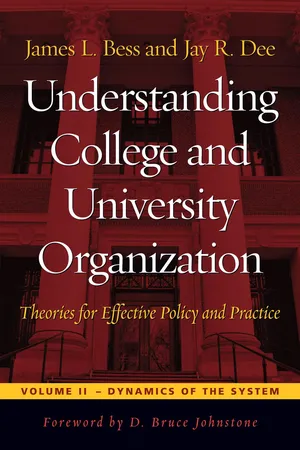
Understanding College and University Organization
Theories for Effective Policy and Practice
- 500 pages
- English
- ePUB (mobile friendly)
- Available on iOS & Android
Understanding College and University Organization
Theories for Effective Policy and Practice
About this book
Now available in paperback, this two-volume work is intended to help readers develop powerful new ways of thinking about organizational principles, and apply them to policy-making and management in colleges and universities.The book is written with two audiences in mind: administrative and faculty leaders in institutions of higher learning, and students (both doctoral and Master's degree) studying to become upper-level administrators, leaders, and policy makers in higher education.It systematically presents a range of theories that can be applied to many of the difficult management situations that college and university leaders encounter. It provides them with the theoretical background to knowledgeably evaluate the many new ideas that emerge in the current literature, and in workshops and conferences. The purpose is to help leaders develop their own effective management style and approaches, and feel confident that their actions are informed by appropriate theory and knowledge of the latest research in the field.Without theory, organizational leaders are forced to treat each problem that they encounter as unique–as if it were a first-time occurrence. While leaders may have some experience with a particular issue, their solutions are usually not informed by the accumulated wisdom of others who have already encountered and resolved similar situations. The authors approach the theory of the organization and administration of colleges and universities from three quite different perspectives, or paradigms, each relying on different assumptions about the "reality" of organizational life in colleges and universities. The positivist paradigm–primarily an omnibus systems theory–integrates the chapters into a comprehensive, yet easily accessible whole. Social constructionism, the second paradigm, is introduced in each chapter to illuminate the difficulty of seeking and finding meaningful consensus on problems and policies, while also addressing important ethical issues that tend to be overlooked in leadership thought and action. The third paradigm, postmodernism, draws attention to difficulties of logic and communication under the constraints of strictly linear thinking that "authorities" at all levels attempt to impose on organizations.This "multiple paradigm" approach enables readers to become more cognizant of their own assumptions, how they may differ from those of others in their organization, and how those differences may both create difficulties in resolving problems and expand the range of alternatives considered in organizational decision making. The book offers readers the tools to balance the real-world needs to succeed in today's challenging and competitive environment with the social and ethical aspirations of all its stakeholders and society at large. The authors' aim is to elucidate how administration can be made more efficient and effective through rational decision-making while also respecting humanistic values. This approach highlights a range of phenomena that require attention if the institution is ultimately to be considered successful.Also available:
Volume 1: The State of the System
Two volume set
Frequently asked questions
- Essential is ideal for learners and professionals who enjoy exploring a wide range of subjects. Access the Essential Library with 800,000+ trusted titles and best-sellers across business, personal growth, and the humanities. Includes unlimited reading time and Standard Read Aloud voice.
- Complete: Perfect for advanced learners and researchers needing full, unrestricted access. Unlock 1.4M+ books across hundreds of subjects, including academic and specialized titles. The Complete Plan also includes advanced features like Premium Read Aloud and Research Assistant.
Please note we cannot support devices running on iOS 13 and Android 7 or earlier. Learn more about using the app.
Information
Table of contents
- Cover Page
- Title Page
- Copyright Page
- Contents
- Problem-to-Theory Application Table
- Foreword
- About the Authors
- Acknowledgments
- Preface
- 1 Overview
- 2 Conflict in Organizations
- 3 Power and Politics in Higher Education ORGANIZATIONS
- 4 Organizational Decision Making
- 5 Individual Decision Making
- 6 Organizational Learning
- 7 Organizational Strategy
- 8 Organizational Goals, Effectiveness, and Efficiency
- 9 Organizational Change in Higher Education
- 10 Leadership
- 11 The End and the Beginning: Fresh Thoughts about Organizational Theory and Higher Education
- SUBJECT INDEX
- AUTHOR INDEX